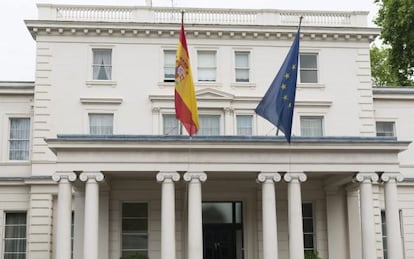London embassy worker charged with misappropriating over €83,000
Spain’s Audit Court investigates claim that suspect used funds to make personal purchases

Spain’s Audit Court is looking into €83,364 worth of unexplained expenses accumulated between 2013 and 2014 at the Spanish embassy in London.
The bills for furniture, refrigerators, baby alarms, folding bicycles, ice cream makers, an iPad and telephone lines do not match any of the equipment listed at the embassy.
The Audit Court’s investigation, to which EL PAÍS has had access, is focusing on an employee – named only as Nieves G. P. – who handled the accounting for the embassy’s information department, and who was in charge of payments to suppliers.
The report expresses surprise that the use of public money for personal gain over several years “did not attract the attention of superiors”
The report says that the alleged misuse of embassy funds could date back to 2006, and expresses surprise at the fact that the use of public money for personal gain over several years “did not attract the attention of superiors.”
The case was reportedly brought to the attention of Spain’s ambassador to London, former Justice Minister Federico Trillo-Figueroa, in 2013, a year after he was posted.
Investigators are also focusing on one of the employee’s direct superiors, Ignacio M. G., who was head of the information department at the time when Nieves G. P. may already have been diverting the funds. He was replaced in 2013, and it was his substitute, Esther Corral, who alerted the ambassador about the suspect transactions.
Media relations
The Spanish embassy in London has several offices focusing on trade, tourism, education, culture and science. The information department is located at 39 Chesham Place, Belgravia, one of the capital’s most exclusive areas. It is responsible for organizing media coverage of all official visits by Spanish dignitaries to the United Kingdom, as well as liaising with British and Spanish journalists.
The money came from funds allocated to protocol and miscellaneous expenses. The newly appointed information department chief noticed invoices for events that she herself was purported to have organized, but never did.
There were also bills for television sets, computers, bicycles, and even toasters – none of which were found at the embassy. Some bills had been tampered with to prevent identification of the delivery address. The embassy was also being charged for seven phone lines, when there were only two authorized numbers.
Corral is also accusing Nieves G. P., who had been working at the embassy since 1995, of forging her signature on accounting documents, meaning that criminal proceedings will now likely follow. State lawyers want to extend the investigation to the years between 2009 and 2012.
“No oversight”
The Audit Court points to what it calls “the clear absence of any oversight” at the embassy as a determining factor in the “recurring diversion of public money.”
Meanwhile, Nieves G. P. denies having forged her superior's signature, saying that many of the payments were made with checks made out to specific beneficiaries, meaning that she could not have personally benefited. She also denies having admitted to her guilt. After the preliminary inquiry, the case will go to trial.
Tu suscripción se está usando en otro dispositivo
¿Quieres añadir otro usuario a tu suscripción?
Si continúas leyendo en este dispositivo, no se podrá leer en el otro.
FlechaTu suscripción se está usando en otro dispositivo y solo puedes acceder a EL PAÍS desde un dispositivo a la vez.
Si quieres compartir tu cuenta, cambia tu suscripción a la modalidad Premium, así podrás añadir otro usuario. Cada uno accederá con su propia cuenta de email, lo que os permitirá personalizar vuestra experiencia en EL PAÍS.
¿Tienes una suscripción de empresa? Accede aquí para contratar más cuentas.
En el caso de no saber quién está usando tu cuenta, te recomendamos cambiar tu contraseña aquí.
Si decides continuar compartiendo tu cuenta, este mensaje se mostrará en tu dispositivo y en el de la otra persona que está usando tu cuenta de forma indefinida, afectando a tu experiencia de lectura. Puedes consultar aquí los términos y condiciones de la suscripción digital.








































